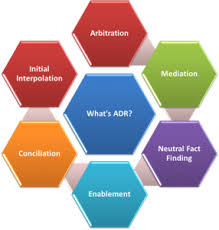ADR mechanisms reduces backlog of cases in courts – ADR Judge

Justice Irene Charity Larbi, Judge-In-Charge of Alternative Dispute Resolution (ADR), has said the use of ADR mechanisms has assisted to reduce the backlog of cases substantially in the courts.
She said most courts have been decongested, and thus allowing judges to have more time to handle cases not amenable to ADR.
“ADR cuts down the cost of litigations, makes justice more accessible to a greater number of people, enables parties to express their emotional needs and equipped individuals in the case as it offered them the opportunity to be heard and contribute to the outcome of the case, which would be beneficial to them”, she added.
Justice Larbi, who is also a Justice of the Court of Appeal said this at the Tarkwa in the Western Region, when she launched this year’s ADR week on the theme: “Making our courts user friendly through the use of ADR”.
She said the courts could only be said to be friendly when the adjudication process was expeditious, devoid of unnecessary expense and ensured that all matters disputed between parties were completely, effectively and finally determined and the multiplicity of proceedings concerning such matters avoided.
She said although the regular court system had its own strengths, it was sometimes characterized by factors which occasioned delays and cost, hence making access to justice most of the time very difficult.
This, she said, clearly indicated that the ADR mechanism was a reliable partner to the traditional justice delivery system and must therefore be embraced, nurtured for quality justice delivery.
According to Justice Larbi, sustenance of ADR was critical in the goal of promoting excellence, speed and efficiency in judicial administration, adding that, “We can only achieve the excellence we seek if judicial outcomes are not the product of long, drawn out processes that lead to pyrrhic victories for parties in a dispute”.
She said the ADR programme had been extended to 131 courts across the nation with at least five mediators assigned to each of the courts.
A total of 653 mediators have been trained and assigned to the courts connected to the ADR programme, Madam Larbi said.
She announced that from January to December 2019, a total of 6,209 cases were mediated upon of which 3,041 cases were settled, representing 49 percent.
Madam Larbi emphasized that it was their expectation that in the years ahead ADR would become not just a complement to the justice delivery architecture, but rather a major plank which would be the go-to option for seeking justice as long as the nature of the case admits of that intervention.
The ADR Week is a week set aside in each Legal Year to create awareness and educate the citizenry on the importance of ADR for them to embrace it to enhance justice delivery.
The Week also gives opportunity to parties who have their cases pending in courts that are connected to the ADR Programme to have them settled through mediation and other ADR resolution mechanisms.
Source: GNA




